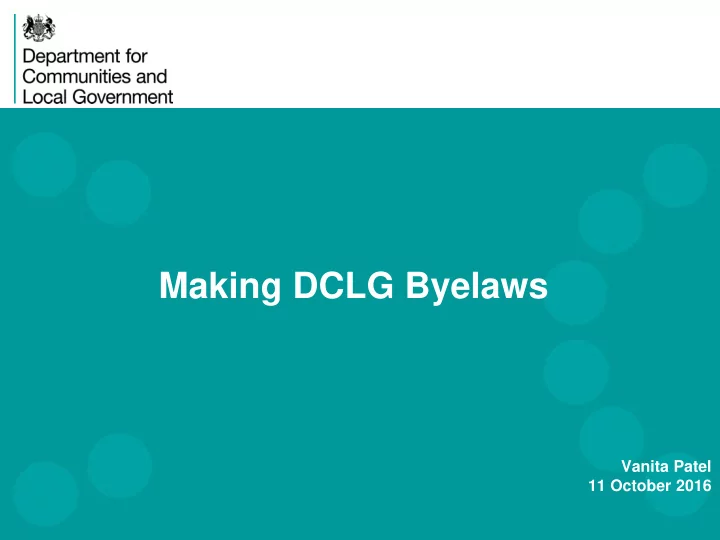

Making DCLG Byelaws Vanita Patel 11 October 2016
Making byelaws under new arrangements • Overview of byelaws • Key features of new arrangements • Process for making and revoking a byelaw • Enforcement of byelaws • Top Tips • Further details and guidance 2 :
Overview of byelaws • What are byelaws? • When are byelaws considered? • New Regulations - what does it mean? • What are model byelaws? • How byelaws sit with PSPOs? 3
Key features of new arrangements • Old arrangements • New arrangements – transferring power to local councils – local accountability • Secretary of State role when making a byelaw • DCLG scrutiny role • Revoking a byelaw – No DCLG role 4
Process for making a byelaw Step 1 - Draft proposed byelaw, assessment and consultation Step 2 - Submit application for approval Step 3 – Secretary of State Decision Step 4 – Advertise and consult on the proposed byelaw Step 5 – Consideration of representations/deciding to make the byelaw Step 6 – Publicity after making the byelaw/byelaws coming into force 5
Process for revoking a byelaw Step 1 - Assessment and consultation Step 2 – Deciding to revoke the byelaw Step 3 – Revoking the byelaw Step 4 – Publicity after revoking the byelaw 6
Enforcement of byelaws • How are byelaws enforced? • Byelaws and FPNs • Byelaws and Council enforcement policy • Role of byelaws in influencing behaviour 7
Top Tips • Start preparation well in advance – identifying groups potentially affected • Benefits of using consultation to inform and shape final byelaws. • Evidence and data to inform and develop robust application…and why this is important 8
Further Details and Guidance • The Byelaws (Alternative Procedure) (England)Regulations 2016 (www. legislation.gov.uk) • Explanatory Memorandum (www. legislation.gov.uk) • Model byelaws & guidance notes (gov website) • Step by Step guidance on making and revoking byelaws (gov website) • byelaws@communities.gsi.gov.uk
Recommend
More recommend